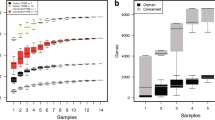Abstract
The origin and function of orphan genes (OGs) is a mysterious problem in modern molecular biology. The recently developed PHOG database helped to shed light on some aspects in the evolution of these genes. Presumably, a rapid evolution is the main factor that influences the origin of OGs. The evolutionary rate of particular genes reflects the degree of their conservation, although exceptions from this rule contribute to the dynamic process of genome evolution during speciation. It is demonstrated that a great number of OGs detected is an artifact of insufficient sequencing. If DNAs of all organisms living on Earth were sequenced, then the OG number would be greatly reduced, giving the way to genes specific of particular taxonomic groups.
Similar content being viewed by others
References
Domazet-Loso T., Tautz D. 2003. An evolutionary analysis of orphan genes in Drosophila. Genome Res. 13, 2213–2219.
Siew N., Fischer D. 2004. Structural biology sheds light on the puzzle of genomic ORFans. J. Mol. Biol. 342, 369–373.
Siew N., Fischer D. 2003. Analysis of singleton ORFans in fully sequenced microbial genomes. Proteins: Structure, Function, and Genetics. 53, 241–251.
Fischer D., Eisenberg D. 1999. Finding families for genomic ORFans. Bioinformatics. 15, 759–762.
Siew N., Fischer D. 2003. Unraveling the ORFan puzzle. Comp. Funct. Genomics. 4, 432–441.
Monchois V., Abergel C., Sturgis J., Jeudy S., Claverie J.-M. 2001. Escherichia coli ykfE ORFan gene encodes a potent inhibitor of C-type lysozyme. J. Biol. Chem. 276, 18,437–18,441.
Shmuely H., Dinitz E., Dahan I., Eichler J., Fischer D., Shaanan B. 2004. Poorly conserved ORFs in the genome of the archaea Halobacterium sp. NRC-1 correspond to expressed proteins. Bionformatics. 20, 1248–1253.
Alimi J.-P., Poirot O., Lopez F., Claverie J.-M. 2000. Reverse transcriptase-polymerase chain reaction validation of 25 “orphan” genes from Escherichia coli K12 MG1655. Genome Res. 10, 959–966.
Schmid K., Aquadro C. 2001. The evolutionary analysis of “orphans” from the Drosophila genome identifies rapidly diverging and incorrectly annotated genes. Genetics. 159, 589–598.
Fischer D. 1999. Rational structural genomics: Affirmative action for ORFans and the growth in our structural knowledge. Prot. Eng. 12, 1029–1030.
Merkeev I., Novichkov P., Mironov A. 2006. PHOG: A database of supergenomes built from proteome complements. BMC Evol. Biol. 6, 52.
Merkeev I., Mironov A. 2006. PHOG-BLAST: A new generation tool for fast similarity search of protein families complements. BMC Evol. Biol. 6, 51.
Author information
Authors and Affiliations
Corresponding author
Additional information
Original Russian Text © I.V. Merkeev, A.A. Mironov, 2008, published in Molekulyarnaya Biologiya, 2008, Vol. 42, No. 1, pp. 143–149.
Rights and permissions
About this article
Cite this article
Merkeev, I.V., Mironov, A.A. Orphan genes: Function, evolution, and composition. Mol Biol 42, 127–132 (2008). https://doi.org/10.1134/S0026893308010196
Received:
Accepted:
Published:
Issue Date:
DOI: https://doi.org/10.1134/S0026893308010196




